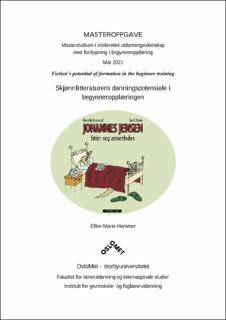Skjønnlitteraturens danningspotensiale i begynneropplæringen
Master thesis
Published version
Permanent lenke
https://hdl.handle.net/11250/2789405Utgivelsesdato
2021Metadata
Vis full innførselSamlinger
Sammendrag
Formålet med denne masterstudien er å undersøke hvordan bruken av skjønnlitteratur i begynneropplæringen kan legge til rette for elevenes danning. Her vil jeg se nærmere på hvordan ulike faktorer som valg av litteratur, sammensetning av didaktiske tilnærminger, lærernes bruk av spørsmål og teknikker underveis i arbeidet, og klassemiljøet kan påvirke utfallet. Samtidig vil jeg gå i dybden på elevenes reaksjoner for å finne ut om tegn til danning kan sies å komme til uttrykk i møte med skjønnlitteraturen. Problemstillingen jeg skal belyse er; Hvordan kan bruk av skjønnlitteratur i begynneropplæringen legge til rette for elevenes danning? Teorigrunnlaget gjør rede for danningsbegrepet og dets rolle i norskfaget, skjønnlitteraturens potensiale, de fire fasene under forestillingsbygging og de tre didaktiske tilnærmingene benyttet i denne studien; høytlesning, litterær samtale og tekstbasert skriving. Jeg benyttet en kvalitativ tilnærming, med observasjon og supplerende intervju for å innhente datamateriale. Deltakere i denne studien er elever fra andre- og fjerdetrinn, med deres lærere. Funnene viser at lærerne la til rette for at elevene skulle stige inn i og bevege seg i tre av fire faser for forestillingsbygging, i samsvar med Judith Langers teori. Samtidig vektla de vekstpedagogikk i form av å veilede dem underveis, men også ved å utfordre dem til å utdype og reflektere videre over egne svar. På den andre siden viser funnene at elever på begge trinn beveget seg inn i og gjennom alle fire fasene. Flere av elevenes uttalelser og handlinger kan tolkes som tegn på danning. De mestret å utrykke egne tanker, følelser og meninger på en forståelig måte og viste tegn til evner som empati, logisk- og kritisk tenkning. Funnene tyder også på at fjerdeklassingene har kommet lengre i utviklingen, enn andreklassingene. Studiens funn viser at skjønnlitteraturen er et godt utgangspunkt for å legge til rette for elevenes danning. Den fungerer som en inngang til unike forestillingsverdener og samhandling med medelever gjennom didaktiske tilnærminger og lærernes tilrettelegging. The purpose of this master thesis is to examine how fiction in the beginner training can facilitate for the pupil’s formation. Here I will take a closer look at how some of the factors like choice of literature, the composition of didactic approaches, the teachers use of questions and techniques during the class and the classroom environment can affect the work with fiction and how that can facilitate for the pupil’s formation. Simultaneous I want to be able to understand the pupil’s reactions and look for any sign of formation that may be present them self when working with this book. My topic question is this; How can the use of fiction in the beginners training facilitate for the pupil’s formation? My theoretical basis explains the formation term and its role in the Norwegian subject, the fictions potential, the four stances during envisionment building and the three didactic approaches used in this study: reading aloud, literary conversation and text-based reading. I have used a qualitative approach, with observation and complementary interview to extract data. Participants in this study are pupils from second- and fourth grade, with their teachers. My findings show that the teachers facilitated for the pupils to enter and move through three of the four stances during envisionment building, in accordance with Judith Langer’s theory. At the same time, the teachers emphasized the pupil’s growth by guiding them as they went, but they also challenged their thinking by encouraging them to elaborate and reflect more upon their own answers. On the other side my findings show that pupils in both classes entered and move through all four stances. Many of the pupil’s statements and actions can be explained as signs of formation. They mastered expressing their own thoughts, feelings and opinions in an understandable way, and showed signs of abilities as empathy, logic- and critical thinking. The findings also show that the fourth graders have come further in their development, than the second grades. The study’s findings show that fiction is a good base to facilitate for pupil’s formation. It works as an entrance to unique envisionments and cooperation with fellow pupils through didactic approaches and the teachers facilitating.
